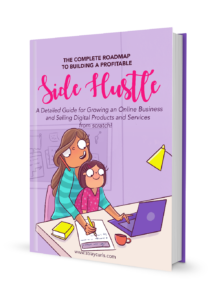Are you considering getting a job in data entry, or starting a freelance data entry business? In this blog post, I am going to show you how to get a job in data entry, including my top tips to help you stand out from the competition.
Many years ago, data entry was something that had to be done in an office. But now, with technology becoming more and more advanced every day, and with new software being developed to make it easier than ever to work from home, it is completely possible to find a data entry job that you can do right from the comfort of your own home.
One of the great things about data entry is the barrier to entry is very low. All you need is a computer and an internet connection to get started. The next thing you need to think about is how to actually get a job in data entry. Let’s get started.
What is data entry?
Data entry is a broad term that can describe work that is done in multiple industries, and the work itself will vary. But at the core of it, data entry is the process of inputting data or information into a computer system or software. Numerous industries require data entry which is what makes it such a legitimate remote job position for anyone who wants or needs to work from home.

What skills are required for a data entry job?
Like any job, there are certain skills that are required in order to do the job accurately, and efficiently. Here are the most common skill sets that potential employers might be looking for.
Computer Skills
Since you will be working remotely, having some basic form of computer skills is a must. Now, this does not mean you need to know the ins and outs of everything about computers. However, you should know how to use the operating system, typically Windows or Mac, how to use industry-specific software, etc.
Attention To Details
Most data entry jobs will be quite repetitive, so it is important to have strong attention to detail. Mistakes can be costly and time-consuming to fix. Therefore, it is extremely important to be able to stay focused while you are inputting the information into the computer.

Typing Accuracy
To aid in doing the job accurately, you will also want to ensure you have good typing accuracy. This can help to avoid mistakes and ensure you do your job as efficiently as possible. Some companies may even ask you to take a typing test during the interview process to test your speed and accuracy.
If you would like to brush up on your typing skills, places like typing.com give you the exercises needed to improve your skills.
Typing accuracy is not only good for your employer, but it is also good for you. The more accurate you are, the less time you will spend looking back over your work to find errors. Plus, if you are doing data entry as a freelancer, you will actually be able to bring on more clients the more efficiently you can work.
Organization Skills
When you are working from home and working with data, it will be extremely important that you have strong organizational skills. This will help to ensure that you can keep track of all the data and files you are working with as well as any deadlines you need to meet.
Good Time Management
Time management is another key skill when working from home, as you will need to be able to manage your time wisely in order to get all of your work done as efficiently as possible.
It can be easy to be distracted by your kids, your pets, or tasks that need to be done around the house. However, it is incredibly important that you maintain good time management so that you can ensure you meet your deadlines. Consider having dedicated working hours where you cannot be disturbed. Having a dedicated working space in your home can also be helpful.

Read: 10 Best Productivity Tips For Working Remotely
Self Motivation
When working from home, it is easy to lose motivation to get our work done. There are so many distractions, and you might even find yourself feeling lazy on occasion. Therefore, it is important that you implement strategies and tools to help you maintain your self-motivation. This could include things like:
- Removing distractions
- Working in time blocks or with the Pomodoro technique
- Having a reward-based system for when you get your work done
Ability To Work Independently
And last but not least, it is important that you are able to work independently as you will not have anyone working with you on these tasks nearby. You will need to be able to take initiative and get the job done without being micromanaged.
Are you looking to do data entry as a side hustle?
Make sure you set up your side hustle business the right way by following this step-by-step roadmap for starting a profitable side hustle!

What qualifications are needed for data entry?
While there are no formal qualifications required for a data entry job, some companies or employers may ask that you have some prior experience or training in office administration, data entry, etc.
If you would like to get certified in data entry, you can typically find certifications at most accredited universities. While these are not necessary, they can definitely help you stand out from your competition.
When creating your resume, also consider what transferable skills you have. If the position you are applying for asks for data entry experience in one industry, but you don’t have that, look to see what other experience you can bring to the table. Did you do data entry in another industry? Do you have a working knowledge of the software that they are using? Include any relevant qualifications that you have.
4 Types Of Data Entry Jobs You Can Easily Do From Anywhere
There are a few different types of data entry jobs you can do from home which we will touch on next. While some jobs may focus on just one of these types, there are jobs where you will actually do a mixture of data entry types.
Data Entry Clerk
One of the most common types of data entry jobs is that of a data entry clerk or operator. As a data entry clerk, your job will be to input data into the company’s system, spreadsheets, or whatever process they use in their business to compile data. General data entry can include inputting names, numbers, emails, phone numbers, sales information, inventory, research, and more.
Data Transcriptionist
Another type of data entry job is to be a transcriptionist, in which your job would be to transcribe audio or video files into written text. This is often done for companies that need to transcribe meeting notes, lectures, or other types of audio/video files.

Word Processing
Word processing is another common type of data entry job. As a word processing operator, your job will be to create, edit, and format documents using word processing software. This could include creating reports, presentations, or other types of business documents.
Data Researcher
Lastly, there is the job of being a data researcher. Your job will be to research and compile data for the company you are working for. This could include things like researching customer trends, market research, social media trends, advertising results, and more.
The Most Common Industries That Require Data Entry
While there are many industries and companies that will require data entry, there are some industries that routinely require data entry. Here are the 4 most common ones you will see on the market.
Finance And Banking
The banking and finance industry is one that commonly requires a lot of data entry. Some examples of things you could be required to do in this industry include inputting customer data, logging financial transactions, tracking payroll, or anything else that is related to the finances of a company or person.
There are also multiple umbrellas within this industry that you could fall into.
For example, you could work as a bookkeeper for smaller companies. This would include tasks like entering transactions, logging refunds, tracking inventory, and more. It could also include tasks like reconciling accounts and preparing financial reports.
You can also work as an account administrator. These types of jobs are really common in accounting offices, as well as small businesses with lots of inventory or companies that offer services. Responsibilities within these job roles could include entering payments onto customer or vendor accounts, entering transactions, updating contacts, etc.

Healthcare
The healthcare industry is another one that commonly requires data entry. This is because there is a lot of patient data that needs to be input, whether it be for medical records, billing, general patient information, etc.
You can often find jobs within the government health care system as most places have a universal tracking hub that will track all patient information and data.
Most individual healthcare practices will also require data entry including dentists, chiropractors, specialists, etc. For these private practices, you will typically be responsible for updating customer data, billing, etc.

Sales
The sales industry is another one that requires a lot of data entry. The data that needs to be tracked can include customer information, logging sales, tracking inventory, updating vendor information, etc. Data entry in the sales industry could also be combined with financial data entry like inputting information from receipts, orders, invoices, and refunds.
There will be many umbrellas that fall under the sales category. Some common examples include general retail, real estate, and eCommerce. Service-based businesses like lawn maintenance companies, plumbers, etc. would also fall under this category.
Administrative
Many companies will also require general administrative data entry. This is often because they have a lot of customers and vendors to manage, and all of these things require data entry. Administrative data entry could include tracking hours, updating contact lists, scheduling, results tracking, and more.
How to get a job in data entry
Now that we’ve gone over some of the basics of what data entry is and what types of jobs you can do, let’s talk about how you can actually get a job in data entry.

Deciding What You Want To Do
As you can see in the section above, there is a lot of overlap between the industries as many of them require similar types of data entry. One of our top tips is to actually niche down and become a specialist in one of these industries. Having that knowledge and experience in a certain field can help your resume to stand out to potential employers as it will require less training, and you may be able to bring more to the table in terms of ideas and solutions to potential problems.
For example, you could market yourself as a data entry specialist for Real Estate agents. This data entry could include a combination of administrative data entry, sales data entry, and financial data entry.
Take some time to review the industries and jobs outlined above that are commonly hiring for data entry positions and consider which you think you would like to focus on first. You can also look at existing job postings to see what is available on the job market.
Read: How To Get A Remote Job With No Experience – 7 Easy Steps To Follow
Learn The Necessary Skills
Once you have decided what industry(s) you want to specialize in, it’s time to fill in any gaps within your existing skill set.
For example, if you want to work as a bookkeeper, you will need to know how to do basic accounting. This includes things like recording transactions, preparing financial reports, and more.
If you want to work in the healthcare industry, you will need to know how to input patient data into the system. This includes things like medical records and billing.
You should also take time to learn any of the applications or software that companies commonly use. For example, as a bookkeeper, you may want to get certified by QuickBooks online as this is a commonly used program in several companies.
Many companies also use spreadsheets for their data entry, so having a good understanding of how to use Excel and Google Sheets will be extremely valuable.

Get Certified
If you have decided that you would like to get some certification, now is the time to do that. Many accredited colleges offer data entry certificates. While these are definitely not necessary, they can help you to stand out from the competition. If a certain software you need to know how to use also offers certifications, it could be worthwhile to get that as well.
To get an idea of what certifications other people in your industry have, take some time to review their profiles on LinkedIn and other social media accounts they may have.
Create Your Resume
Next, you want to create a resume that clearly communicates what industry you specialize in, your skills, qualifications, and objectives you have for the job. You should also include any relevant experience, even if it’s not in data entry specifically.
Need help writing your resume (and cover letters)?
Check out My Perfect Resume!
My Perfect Resume is a resume builder website that helps you create killer resumes and cover letters. They even have a selection of professional resume templates for you to choose from.
Start Searching For Jobs
Next, you will want to start searching for data entry jobs. A great way to do this is by using job boards like Indeed, FlexJobs, Upwork, and more.
Did you know that FlexJobs researches every company before publishing a job listing? They do the work for you so that you can rest easy knowing that the jobs listed are legit!
Check out FlexJobs here!
If you have a specific company that you want to work for, you can also search for data entry jobs directly on their company websites.
If you don’t want to work for one particular company full-time and would prefer to work as a freelancer with multiple clients, then consider looking at places like Fivver, LinkedIn, etc. You can also look at industry-specific Facebook groups or groups where you think your ideal client would be hanging out.
And finally, don’t forget to network! Getting a job in data entry (or any industry) is often about who you know rather than what you know. So tell your family and friends that you’re looking for a data entry job and see if they have any connections that can help you out. Get active on social media where your potential employers or clients would be hanging out. Attend local networking events and have your resume or business cards ready.
Apply For Jobs That Interest You
Once you’ve found a few jobs that interest you, it’s time to start applying! Make sure to read through the job descriptions carefully and only apply for positions that you are qualified for and have an interest in.
It’s also important to take the time to customize your resume and cover letter for each position that you apply for. This will show the employer that you’re interested in the specific role and not just mass-emailing your resume out to anyone who will listen.
Finally, don’t forget to follow up after you’ve submitted your application. A simple email or phone call can go a long way in making sure that your application gets noticed.
Data entry is a field that is rapidly growing, and there are more opportunities than ever to find remote data entry positions. I hope that this blog post has shown you how to get a job in data entry and that you are ready and confident to start looking for your data entry job.
Read Next:
Are Remote Jobs Legit? How To Tell A Legit Remote Job From A Scam
How To Get A Remote Job With No Experience – 7 Easy To Follow Steps
10 Best Productivity Tips For Working Remotely














